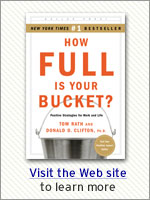Not surprisingly, workgroups drained by excessive [negativity] aren't only less productive and less profitable, they also have higher turnover, more accidents on the job, and lower customer satisfaction, innovation, and quality scores.
And negative employees scare off customers. Think about the last time you called a customer service line and were treated poorly. After this experience, you might have said to yourself, "I am never doing business with that company again." If you were really angry, you might have told others about your experience and recommended that they stop doing business with the company as well. This is the damage one negative employee can inflict on any business.
 |
Recently, we investigated the impact that a single employee can have on customers by studying 4,583 call center representatives from a major telecommunications company. We discovered three service representatives who scared off every single customer they spoke with in a given day -- and those customers did not return. . . . The company would have been better off paying those three representatives to stay home.
Fortunately, this study also identified seven service reps who retained and engaged every single customer with whom they spoke. Maybe you've been lucky enough to talk with a rep like this -- one who listened to your problem, made sure you understood that you were heard, took care of your issues promptly, and left you feeling like he or she really cared about you as a person. Did you want to tell others about this first-class service? And are you still a customer to this day?
The recognition gap
Managers, take note: Praise is rare in most workplaces. One poll found that an astounding 65% of Americans reported receiving no recognition for good work in the past year. And we have yet to find anyone who reports suffering from over-recognition. No wonder so many employees are disengaged. Although we need and want recognition and praise, the fact is, we don't get enough -- and organizations suffer because of it.
Most of the time, organizations begin formal recognition programs because someone in upper management has decided that monthly or quarterly awards ceremonies will help raise employee morale. Sounds good, right? What happens is the old reliable "Employee of the Month" program.
For the first few months, the program might actually work. There are usually at least a couple of people who have been top performers for a long time and deserve more recognition. These stars are appropriately showered with public praise.
But after a while, management struggles with the inevitable question: Who should be the next Employee of the Month? Once the executives reach a compromise, a lucky manager must stand in front of the room and say a bunch of nice -- and often insincere -- things about the recipient. The whole exercise ends up feeling like a sham to both the "winner" and the presenter.
Eventually, everyone -- regardless of merit -- gets named Employee of the Month. All their smiling photographs appear on a board in the reception area.
But the whole thing is gratuitous, and everyone knows it. The one who feels the worst, of course, is the employee who receives this recognition last. Why wouldn't he? Management waited months, or maybe more than a year, to praise his "great work," which probably feels about as good as being picked last for a team in gym class.
Of course, some organizations do provide meaningful, deserved, and individualized recognition.
Sincere and meaningful [recognition] increases the morale of any organization. Managers and employees who actively spread positive emotions, even in small doses, will see the difference immediately. And creating that difference can be inexpensive -- or even free. All it takes is a little initiative.